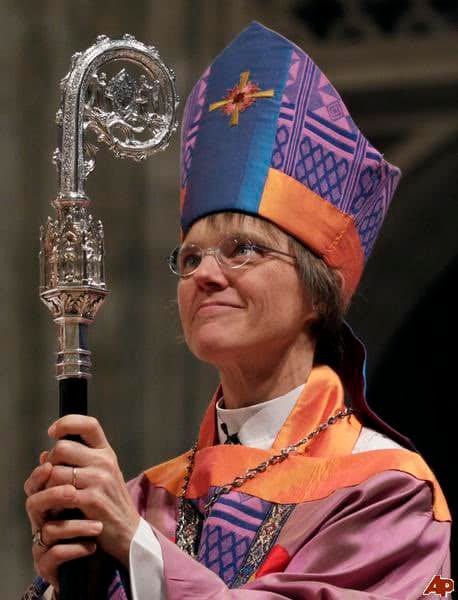The unspeakable dullness of false religion
We should respond to Mariann Budde's desperate rantings with one big collective yawn
The disgraceful behavior of Mariann Budde at Tuesday’s “prayer service” at the Washington National Cathedral has garnered a considerable amount of well-deserved criticism. I have little to say about it, other than what has already been said. I must confess, however, that I am a bit surprised at the level of outrage and indignation expressed by many conservative Christians who are, apparently, ignorant of the history of the Episcopal Church over roughly the last half century. The “National Cathedral” is a vestige of that denomination’s once prominent place in American cultural and political life; a place that has long since been supplanted by the godless secularism that all mainline churches now seek to imitate and appease. In the social, religious, and political context of contemporary American culture, a pitifully frail woman cosplaying in Anglican liturgical garb, lecturing the President of the United States like a nagging school marm, looks more like a sketch from the British comedy troupe Monty Python than anything remotely resembling “speaking truth to power” (as Budde’s defenders have laughably claimed).
I am reminded of a debate between Richard John Neuhaus and John Shelby Spong that aired on William F. Buckley’s Firing Line program in 1988. Spong had just published his pseudo-scholarly tome, Living in Sin? A Bishop Rethinks Sexuality, in which he articulated a revisionist sexual ethic that was then still considered scandalous by the general Christian public. Neuhaus, at the time a Lutheran pastor on the road to becoming a Catholic priest, was asked if he found Spong’s book and its unorthodox ideas to be “appalling.”
In his typical erudite manner, Neuhaus responded, “I don’t find the book appalling. I find it unspeakably dull.”
There was nothing “controversial” about Spong’s book, Neuhaus said. One could read People magazine or watch Dr. Ruth Westheimer’s then popular television show and find the same ideas presented. Furthermore, the book was written in a “mean-spirited” and “narrow-minded” way that “rail[ed] against everybody who disagrees,” using such uncomplimentary terms as “prejudiced,” “victims of superstition,” “ignorant,” and “hypocrites.” It was “a conventional presentation of terribly familiar viewpoints” presented in “an unusually mean-spirited and narrow-minded” tone.
The desperate rantings of Mariann Budde in 2025 can be dismissed in much the same manner as Neuhaus dismissed the “terribly familiar viewpoints” of John Shelby Spong in 1988. False religion (especially the kind that wears a thin veneer of Christianity as a skin suit) is, and always will be, “unspeakably dull.” The appropriate response is not over-the-top outrage or indignation, but one big collective yawn.


We can afford to yawn, because we know truth, but I think C.S. Lewis' argument for the need for apologetics was that educated believers have a duty to the uneducated and to the unsaved, and therefore must stand up in defense of it.
Happily, in this case, we probably don't need to do much, because the Bishop is in herself a recapitulation of everything which normal people are revolted by: the conviction of moral superiority, the smugness which enables nattering. She's the ultimate Karen.
Even the quiet, semi - neurasthenic delivery works against her. If she had thundered the way the late, forgotten Molly Yard was wont to do, she might have convinced many that she was so impassioned, she just could not help herself.
She's every man's dread.
Politically, it's only a win for Trump. Spiritually, it's a godsend in that her preposterousness serves as an example of why St Paul forbade women to become pastors.
Imagine calling yourself a Christian and hating a person for preaching mercy.